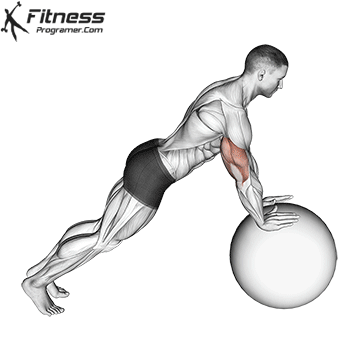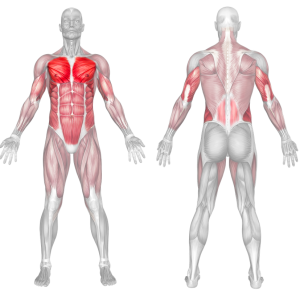Stability Ball Push-up Overview
A stability ball push-up is a variation of the standard push-up where you place your hands on a stability ball instead of the floor. The instability of the ball forces your core, shoulders, and stabilizing muscles to work harder to maintain balance, increasing the difficulty and effectiveness of the exercise.
How to Perform the Stability Ball Push-Up

Setup:
- Place a stability ball on the floor in front of you.
- Get into a high plank position, placing both hands on the ball about shoulder-width apart.
- Extend your legs behind you, keeping your body in a straight line from head to heels. Engage your core to maintain stability.
Execution:
- Slowly lower your chest toward the ball by bending your elbows, keeping them at a 45-degree angle from your body.
- Pause for a moment when your chest is just above the ball.
- Push yourself back up to the starting position, fully extending your arms.
- Perform 8–15 repetitions for 3–4 sets.
Tips for Proper Form
- Keep your core engaged to prevent your lower back from sagging.
- Maintain a neutral spine and avoid excessive arching.
- Control the movement to maximize muscle activation and prevent the ball from rolling.
- Keep your elbows slightly tucked instead of flaring them out to protect your shoulders.
- Breathe properly—inhale as you lower yourself, exhale as you push back up.
Common Mistakes to Avoid
- Letting the hips sag—this reduces core engagement and can strain your lower back.
- Using a ball that’s too small or too inflated—this can make balancing too difficult, increasing the risk of injury.
- Rushing the movement—this reduces effectiveness and increases instability.
- Placing hands too close together—this limits balance and increases strain on the wrists.
Benefits of the Stability Ball Push-Up
1. Builds Upper Body Strength
Like a traditional push-up, this exercise targets the chest (pectoralis major), shoulders (deltoids), and triceps, making it an excellent upper body strength builder. The added instability increases muscle recruitment, making the movement more effective.
2. Enhances Core Stability
Balancing on the stability ball forces your abdominals, obliques, and lower back to work harder to maintain proper positioning. This makes it a superior core-strengthening exercise compared to regular push-ups.
3. Improves Balance and Coordination
The instability of the ball challenges your proprioception (body awareness), enhancing coordination and motor control. This benefit translates well into sports performance and daily activities.
4. Increases Functional Strength
By engaging stabilizing muscles, this exercise mimics real-world movements where strength and balance are required simultaneously, making it a great functional training tool.
5. Reduces Wrist Strain
For some individuals, placing the hands on a stability ball reduces wrist discomfort compared to traditional push-ups on the floor. The ball allows for a more neutral wrist position, which can be beneficial for those with wrist pain.
6. Boosts Shoulder Stability
The deltoids and rotator cuff muscles must work harder to stabilize the upper body, which can reduce the risk of shoulder injuries and improve overall shoulder mobility.
How to Incorporate Into Your Routine
- As a Chest & Core Exercise: Perform 3–4 sets of 8–15 reps on upper body workout days.
- As a Progression for Standard Push-Ups: Use this to add a balance challenge once you’ve mastered regular push-ups.
- As Part of a Full-Body Workout: Combine with squats, deadlifts, and stability ball exercises for a well-rounded workout.
- As a Warm-Up or Finisher: Perform high-rep sets (15–20 reps) at the beginning or end of your workout for extra core activation.
Stability Ball Push-Up Muscles Worked

